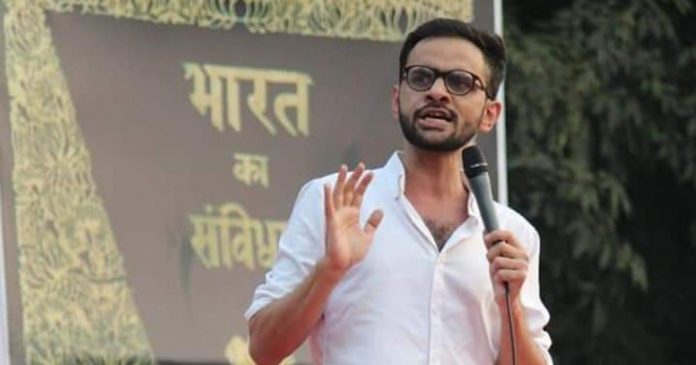To show complete solidarity, they need a conventional Muslim who’s left-leaning, has been painted as an atheist and has not made Islamic references in his speech, writings or protests. Khalid ticked these criteria, Imam did not.
By Tazeen Junaid, TwoCircles.net
On 14 September, after 14 hours of interrogation, Umar Khalid was arrested by Delhi police for his alleged role in inciting Delhi Pogrom 2020. A great hue and cry followed his arrest, which was notably absent in all arrests made in relation to Delhi violence till now.
Arrests of Asif Iqbal Tanha, Meeran Haider, Khalid Saifi and Sharjeel Imam were conspicuous but remain undocumented till date. Arrests of Safoora Zargar, Natasha Narwal, Devangana Kalita and Ishrat Jahan made headlines after feminist groups took up their cause. Even amongst these four, only Safoora got bail. Mohammad Pervez Ahmed, Mohammad Illas, Shahdab Ahmad, Taslim Ahmad, Salim Malik, Mohammad Salim Khan and Athar Khan are names we do not know. All these were arrested under the Unlawful Activities Prevention Act (UAPA) in the same First Information Report as Khalid.
All of them face the same allegations but Khalid is the only one who has garnered widespread support from Indian civil society. He received support and solidarity from the left circles which had maintained its silence on the Delhi chargesheet. Role of Delhi police in February violence wasn’t questioned until Khalid’s arrest. No press conference was held, no statement published when Saifi, Meeran, Asif and Imam were charged with UAPA. There was a ruthless absence of support and solidarity for Imam who is the first incarcerated protestor of Citizenship Amendment Act (CAA) and faces sedition for his speeches at Jamia Milia Islamia (JMI) and Aligarh Muslim University (AMU).
Khalid and Imam’s cases are similar in many aspects. Both face sedition because of their speeches. But while Imam’s arrest only garnered conditional solidarity, why did Khalid’s arrest cause the sudden influx of solidarity and support to CAA protestors?
The mainstream communists, media-houses and civil society prefer conventional politics of Muslims who cloak their identity over assertive identitarian politics. To show complete solidarity, they need a conventional Muslim who’s left-leaning, has been painted as an atheist and has not made Islamic references in his speech, writings or protests. Khalid ticked these criteria, Imam did not.
This is why Imam didn’t receive any support then and doesn’t receive any support now. Even the alternate media has continued its silence on his incarceration. The only people who unconditionally support him are the students from Jawaharlal Nehru University, JMI, AMU and IITs who had protested along with Imam before he was incarcerated. If it’s hard for you to categorize, they are the ones who had no problem with protestors asserting their identity.
When the activists who have been established by the media as mainstream did extend their support to Imam but they did so with condemnation and disapproval apparent in their patronizing tones. Professor Apoorvanand Jha termed his speech ‘wild and irresponsible’ while Shuddhabrata Sengupta accused him of idiocy, stupidity and complete mindlessness six times in a Facebook post.
The main barricade stopping solidarity for Imam is his unapologetic assertion of identity which Ramchandra Guha, relates to ‘a medievalist ghetto’. It is the same identity they do not see or do not want to see in Khalid. Imam’s assertions have been labelled communal while Khalid could not assert it as he wanted to.
Intellectual dishonesty and a fraudulent understanding of solidarity have resulted in Imam being disowned. Ignoring his incarceration might lead to another Indian episode of amnesia which denies Indian Muslims their right to be free.
Mudasir and Samreen wrote on Caravan, “The liberal solidarity is offered as a favour, as a teaching for the ‘other’ on how to protest. Liberals direct how the oppressed engage with the movement; they claim to stand with the oppressed but muzzle their voice in the process.”
To stand in solidarity is to support one unconditionally just like asserting identity is rejecting the garb of conditional solidarity. It is a duty towards the oppressed, not a comfortable act to satisfy one’s conscience.
Sharjeel Usmani, another activist who received no solidarity or press conferences when he was illegally arrested, wrote on FirstPost, “People whose solidarity comes with terms and conditions and the people who speak on behalf of the oppressed are doing nothing but injustice to the oppressed.”
If they came out to support Khalid, they should have come out for Imam. Fraudulent solidarity needs to be replaced with unconditional solidarity. Anything else has to be called out.
Tazeen Junaid is a Bachelor’s student at Aligarh Muslim University.

